Fahad Almasri: Becoming a Pro-Israeli Syrian
"I am the fruit of the behaviour of the Syrian regime toward its population.”
In a previous article, I asked Fahad Almasri, President of the National Salvation Front in Syria, why he is leading an opposition against President Bashar Assad. Almasri answers that it is related to how he was treated by the Syrian regime as a child and how he has been treated since then, as an adult, by the Syrian regime.
“I am the fruit of the behaviour of the Syrian regime toward its population.”
In this article, I bring you Almasri’s description of his experiences in Syria and then in France, all of which led him to seek the downfall of Bashar Assad, the establishment of democracy in Syria, and peaceful relations with Israel. Almasri told this story over two separate interviews, one with the help of his friend Abdul Aziz Ajini (Arabic-English translation) and the other with the help of my friend Navonel Glick (French-English translation). I put the material from both interviews together into a cohesive story, one that Almasri checked to make sure I understood everything accurately.
We are an old family in Damascus. My father is a well-known businessman and my grandfather was a building contractor who was responsible for many construction projects in Damascus and Amman, Jordan. Those buildings still bear the family name, a name which has been known in Syria for more than 20 generations.



Childhood
When I was a 13-year old school boy, I was playing with another boy whose father was a high-ranking officer in the Syrian army. That boy used to put a photo of Hafez Assad on his jacket. Once, while playing with that boy, I asked him to remove the photo of that ‘animal,’ referring to Assad, of course, from his jacket. I was unaware of the size of the disaster I was bringing down upon myself and my family. That incident was a turning point in my life.
The school management subjected me to an investigation and then sent me home. I was not allowed to go back to school before bringing my father in. When panic overwhelmed my family at home, I knew what a big problem I had created for them. The next day, I came back to school with my father. He beat me in front of all the students, teachers, and the school administration. I was angry at my father then, but later I understood that he had to do that to protect me and the whole family.
As a result of that experience, I was severely ill for two weeks and the doctor said that I had tuberculosis.
That was not the end of the issue because many intelligence branches started investigations.
I wondered what crime I had committed that justified so much insult, humiliation, torture, and panic. And this incident opened my eyes to politics.
I remember playing with Syrian Jewish children. They were my friends. So it shocked me that one day, most of the Syrian Jews that I grew up with just disappeared. They went everywhere in the world: to Mexico, to the United States, to Israel, everywhere in the world.
“Why?” I asked myself. “They are Syrians like me.”
I wondered why I lost my childhood friends. Because being a Jew is a crime? No, it's not a crime, I thought. It made no sense to me.
Young Adulthood
I decided to study Political Science after high school. In Syria, one could not study Political Science unless one was a member of Al-Ba’ath Party and had a recommendation from the party leadership because the Higher Institute for Political Science belongs to the Al-Ba’ath Party instead of the Ministry of Higher Education. I managed to get the approval of Al-Ba’ath Party, but I was soon expelled when my security file related to that old problem at school came to light.
Then I started studying Arabic Literature at Damascus University because I was fond of literature, novels and theater. I published many short stories in Syrian newspapers and magazines. In fact, when I was only 14 years old, my first story, "The Doll and Piasters [Middle Eastern currency]” was published and in 1984 it was republished in the weekly “Cultural Magazine,” one of the best known cultural magazines. At the same time, I started working in business and construction as my father wished. I opened an import-expert firm and a small workshop for manufacturing clothes.
That ended when I was arrested and tortured. Because of this, I moved to Lebanon and then to France.
Exile
In France, I was attracted to journalism as there was freedom of speech in the media. Completing MA studies in journalism in Paris University in 2008, I had learned photography, video production, and TV editing. I found work as a correspondent for many newspapers, Arabic media agencies, and TV channels, and in 2010-11, I presented a TV programme in London against the Assad regime.
I am married to Nadia, a Moroccan woman from a conservative family with Andalusian origins. We have three children, two sons and one daughter. The older two are university students and the youngest is still in middle school.

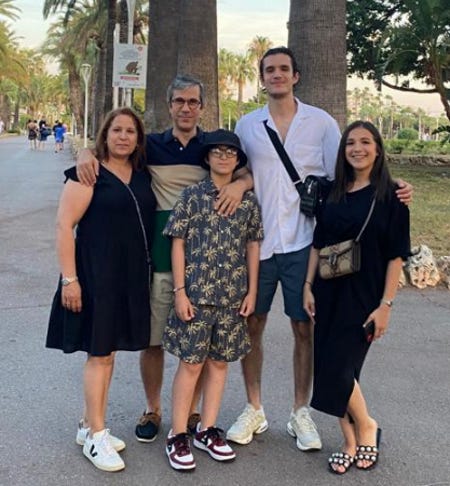
MEETING SHIMON PERES IN PARIS
I had the great honour of meeting President Shimon Peres. It was a total surprise. I met him by chance and he was very welcoming, very open. Meeting him exposed me to the fact that Israeli leaders are very open to dialogue while we Syrians are closed.
This experience, which I will discuss in a moment, reminded me of my childhood questions about why my Jewish friends disappeared. Being Jewish isn't a crime, I remembered thinking. They were my friends where we had all played together.
As a journalist here in Paris, meeting Israeli journalists for the first time in my life was a shock. That was because, you know, for the Syrian regime with its media, Israelis are the enemy. So at first it was a shock to meet Israeli journalists. After some time, it became normal. The psychological barrier fell.
One day, a Moroccan friend, a BBC correspondent, invited me to a restaurant. When we arrived there, I discovered that it was a Moroccan Jewish restaurant. There was the flag of Israel in the restaurant. And it was a shock for me the first time. My Moroccan friend told me to calm down, “Calm down, think carefully,” he said. Then it became normal.
My experience shows why you have to understand the population of the Arab countries. I am here in Europe and interactions with Israelis shocked me for the first while. So we have to understand the people who are still in Syria or in Arab countries. It's not easy to break, to destroy, the psychological barriers.
One day, when I had a day off work and I was on the way to see a friend, I passed by the Foreign Press Center in Paris. There was quite the crowd in front of the building, lots of journalists. When I asked what was happening I was told that it was a press conference for Mr. Peres, the Israeli Foreign Minister. There I was, without any material, without anything written, totally unprepared, because it was my day off.
By the time I got there, it was near the end. Looking for a seat, a man asked what I wanted. I told him I was a Syrian journalist and I wanted an interview with Mr. Peres. The man happened to be the Israeli Embassy press secretary, Mr. Hassid who, at the time, was either first or second secretary. Perhaps because I am Syrian, Mr. Hassid told me Mr. Peres will grant me an interview.
Five minutes later, I was in a room with Shimon Peres. He put his hand out to greet me, saying, “Do you want me to answer your questions in French or English?” This was the beginning of a fifteen-minute conversation from which I emerged with the understanding that Israelis are not ‘the devil’ and are open to dialogue, hoping for peace.
This conversation, plus my other experiences -- from growing up in Syria playing with Jewish children to encountering the politics of my country to exile and meeting Israelis as a journalist and refugee in France -- all came together when I envisioned peace between a New Syria and Israel. This is my project. This is my dream.

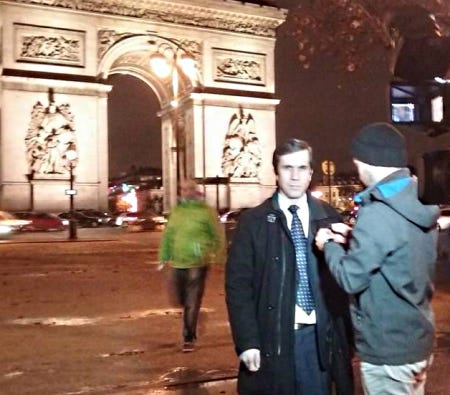
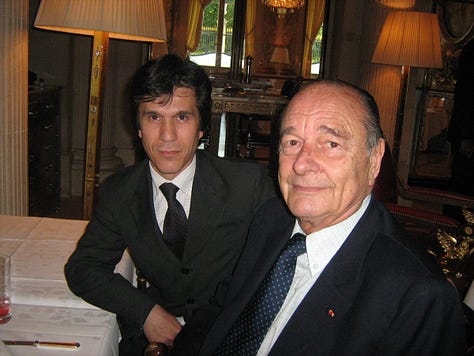
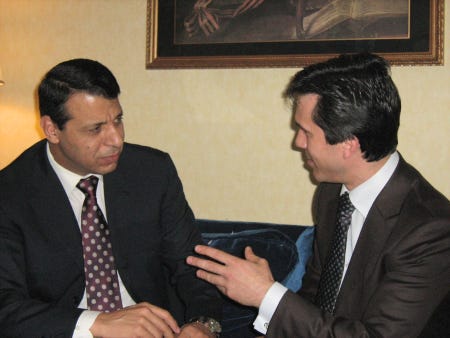


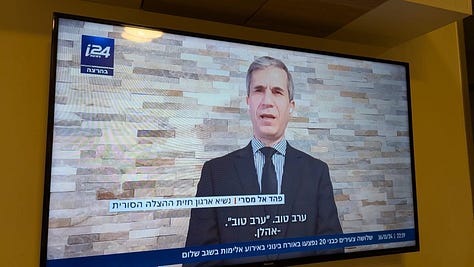


Other interview articles with Fahad Almasri:
Introduction to conversations with Syrian opposition leader Fahad Almasri
Interview with Fahad Almasri: Why is Syria not joining in the War Effort against Israel?
Syrian Opposition Leader wants Israelis to Understand the Complexities facing Syria
Israel is not supported on the Substack payment platform; therefore, I set up a way to make one-time or repeated donations in your own currency using Paypal (Buy me a Coffee, below) or the Ko-fi payment platform here. Isbraelis can send me a private message for another option.
Articles will always be free for all subscribers but a paid subscription or donation is a way to help me sustain myself while doing all the work involved in putting these articles together and would be greatly appreciated.
Thank-you to all those who have supported my work by subscribing and/or by donating coffees.




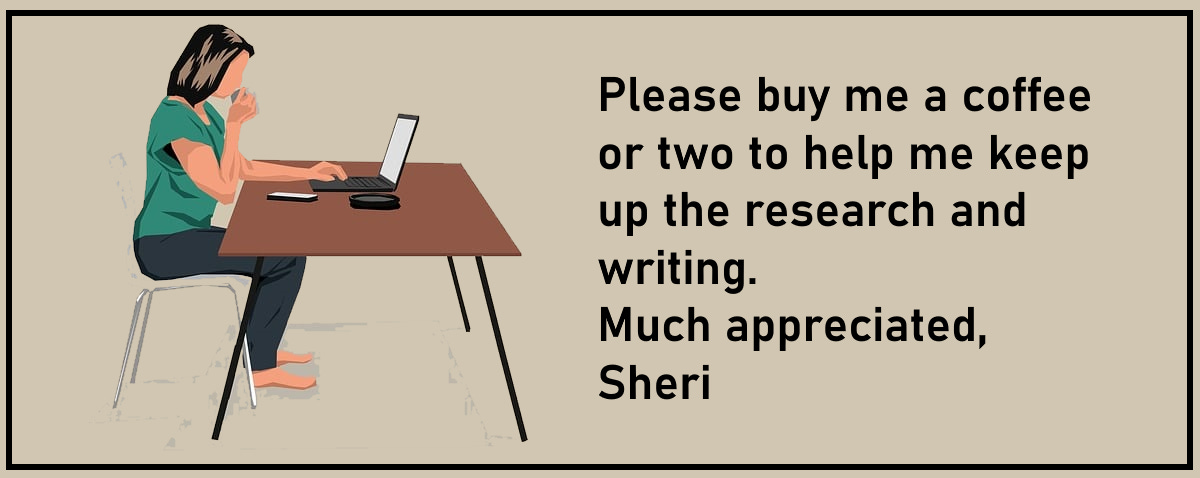
Interesting thank you I think he is not the only Syrian with these views especially among the ex-patriot population. His stories of the good relations between Jews and Muslims in the last century are echoed in the stories of exiled Syrian Jews
Very interesting to read this meaningful article today, after the regime change in Syria.
Awaiting your future articles, Sheri.